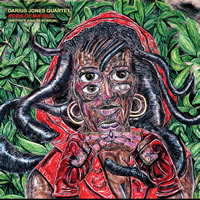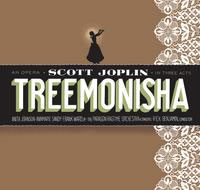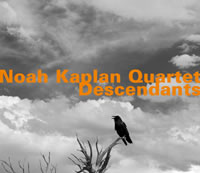Moment's Notice
Reviews of Recent Recordings
(continued)
Darius Jones Quartet
Book of Mæ’bul (Another Kind of Sunrise)
Aum Fidelity AUM072
 To date, alto saxophonist Darius Jones’ recordings have largely documented potential. His trio albums confirm his knack for writing hook-filled pieces, blowing expansively and inspiring his rhythm tandems; his ability to make veteran improvisers dig deep was detailed on his duo CD with Matthew Shipp; and his work with Little Women locates him in a circle of emergent players who also have appreciable potential. However, potential always has an undisclosed use-by date; no one – least of all a critic – can approximate when unfulfilled potential becomes a liability. Jones need not worry about this for the time being, having released Book of Mæ’bul (Another Kind of Sunrise), the debut of his impressive quartet with pianist Matt Mitchell, bassist Trevor Dunn and drummer Ches Smith.
To date, alto saxophonist Darius Jones’ recordings have largely documented potential. His trio albums confirm his knack for writing hook-filled pieces, blowing expansively and inspiring his rhythm tandems; his ability to make veteran improvisers dig deep was detailed on his duo CD with Matthew Shipp; and his work with Little Women locates him in a circle of emergent players who also have appreciable potential. However, potential always has an undisclosed use-by date; no one – least of all a critic – can approximate when unfulfilled potential becomes a liability. Jones need not worry about this for the time being, having released Book of Mæ’bul (Another Kind of Sunrise), the debut of his impressive quartet with pianist Matt Mitchell, bassist Trevor Dunn and drummer Ches Smith.
Arguably, the piano is the hub for everything that seems new or more refined in Jones’ music. Mitchell’s keen sense of how to shape and shade materials, and his ease in roaming the frontier between lead and support functions, makes him an excellent foil for both Jones the composer and the player. As a composer, Jones has a well-developed penchant for resolving familiar forms and phrases in unusual, occasionally jarring ways. Mitchell’s touch at these moments is spot-on, whether he is called upon to feather the material or give it a serrated edge. This, in turn, gives Jones more opportunities than afforded by his trio dates to tweak his attack and timbre to highlight the shifting emotional impetus within a composition. It’s a stretch to suggest that Jones is a flat-out jazz romantic; however, warmth and tenderness do slip to the foreground in his writing, and Jones manages to caress those moments without alloying his piercing sound.
All of this immediately comes into sharp focus with the album’s opener, “The Enjoli Moon,” a melody that has the essence of a lullaby, but is too emphatically stated and has an appended, rhythmically heated passage that primes the improvisations. “So Sad” is an apt title for such doleful balladry; yet, even though Jones leans into the melody with careening long tones and dashes of vibrato to fine effect, there’s a callus-like foundation to his sound that prevents him from sounding naïve. Conversely, Jones doesn’t do happy-go-lucky, even on “Winkie,” a dancing theme that prompts cross-referencing Roland Kirk’s “A Handful of Fives” and Duke Ellington’s “Take the Coltrane” to confirm the slightest of resemblances; heftier than Kirk’s manzello and scrappier than Coltrane’s tenor, Jones’ alto ignites a series of temperature-raising exchanges – he and Mitchell volley before letting Smith and Dunn have at it – intensifying the impact of the piece. There are also ample portions of raise-the-hairs-on-the-back-of-your-neck blowing throughout the album, but there’s always a compositionally-based mitigation that prevents it from becoming gratuitous fire-breathing.
Book of Mæ’bul (Another Kind of Sunrise) is a significant step forward for Darius Jones. His potential grows as a result.
–Bill Shoemaker
Scott Joplin
Treemonisha
New World 80720-2
 “In the first-ever historically authentic orchestration of the work by Rick Benjamin,” reads the back cover. Actually, the first-ever authentic orchestration was composed by Joplin himself. It may or may not have been performed as early as 1913. A Joplin orchestration for solo singers, chorus, and 25-piece orchestra was rehearsed in 1916. An orchestration by Joplin (the only orchestration?) was inherited by Wilbur Sweatman, then by Sweatman’s heir, and survived in forgotten, waterlogged cartons until 1962, when it was destroyed along with cellar trash. All this information is in Benjamin’s extensive and welcomed commentary, which along with Treemonisha’s libretto and two CDs, comes in a small book.
“In the first-ever historically authentic orchestration of the work by Rick Benjamin,” reads the back cover. Actually, the first-ever authentic orchestration was composed by Joplin himself. It may or may not have been performed as early as 1913. A Joplin orchestration for solo singers, chorus, and 25-piece orchestra was rehearsed in 1916. An orchestration by Joplin (the only orchestration?) was inherited by Wilbur Sweatman, then by Sweatman’s heir, and survived in forgotten, waterlogged cartons until 1962, when it was destroyed along with cellar trash. All this information is in Benjamin’s extensive and welcomed commentary, which along with Treemonisha’s libretto and two CDs, comes in a small book.
Benjamin orchestrated Treemonisha for solo singers plus the Paragon Ragtime Orchetra and Singers, comprising a 12-voice chorus and a 14-piece orchestra. Benjamin’s choices depend on his opinion that Joplin intended his work to be performed in music halls of 90-some years ago. But Joplin called Treemonisha a “grand opera.” I haven’t heard the previous orchestrations – by T.J. Anderson (1972), William Bolcom (1973), and Gunther Schuller (1976) – but apparently they took “grand opera” seriously. The Anderson version, with symphony orchestra and choir conducted by Robert Shaw, was telecast and Schuller’s version was available on CD.
The 90-minute length doesn’t make it un-grand, does it? Puccini, Mascagni, and others composed short operas too. Despite the happy ending, despite the abundance of dance numbers and bright, peppy pieces, the subject matter of Treemonisha is too fundamentally serious to make it an operetta. George Gershwin called his masterpiece a “folk opera.” Would “folk opera” also fit, say, The Bartered Bride and Cavalerria Rusticana and Treemonisha?
Okay, enough pedantry. Re: the opera itself; the plot is simple, sentimental, and very touching, especially since Joplin himself lived some of the heroine’s story. In a rural, black Arkansas community where ignorance and superstition are prevalent, ex-slaves Monisha and Ned adopt a little girl they discover under a tree. They name her Treemonisha and see to it she is educated. In revenge, conjurers kidnap her but their own superstitions lead to her rescue. After Treemonisha forgives them for their ignorance, the community elects the wise young woman to be their leader.
Apart from the grand finale, “A Real Slow Drag,” you should know Treemonisha has frequent syncopations but only occasional, usually brief ragtime. It does have Joplin’s African-American folk-like pieces as well as pop-like pieces. There is a ring dance complete with square dance calls; there is a syncopated waltz for eight bears and a schottische. There are a sung sermon, with congregational responses, and a male, almost barbershop, quartet song. There are many other attractive, usually brief songs (arias?) scattered throughout – Joplin loaded his opera with fetching melodies. Here and there you can hear suggestions of older classical composers, for instance Wagner, Schubert, and especially Mozart. Most of all you can hear reflections of 19th-century American popular music, the traditions inherited from Celtic, Germanic, and Italian Europe that grew in the new world’s theaters, churches, minstrelsy, brass bands, and parlor pianos.
This American-music orientation is the best reason for Benjamin’s adaptations. Nevertheless, at dramatic places I can’t help wondering how the music would sound with a full orchestra and chorus. The singers and orchestra sound just fine to me. Two sopranos, Anita Johnson as Treemonisha and AnnMarie Sandy as Monisha, get to sing some of the best pieces and bass Frank Ward Jr., as Ned, has a beauty, “When Villains Ramble Far and Near.” Oddly, in Joplin’s libretto some lines are in 19th-century dialect (“dis,” “dat,” “lak,” “de,” etc., participles endin’ in apostrophes), some are not. Fortunately the singers simply ignore the dialect.
Treemonisha was already archaic when it was composed – Joplin’s contemporaries included Richard Strauss, Debussy, Puccini, as well as Jerome Kern and James Reese Europe and the Castles, whose modern dancing surely contrasted with the old Treemonisha dance styles. So probably it was inevitable that Joplin’s masterpiece was ignored. Too bad. This album is all pleasure; there’s some lovely music here.
–John Litweiler
Kidd Jordan
Live At The Guelph Jazz Festival 2011
Engine e042
Kidd Jordan + Joel Futterman + William Parker + Alvin Fielder
On Fire
Creative Collective 01

 “Every writer creates his own precursors,” Jorge Luis Borges declared in an essay on Franz Kafka. Jazz musicians don’t have the novelist’s means to transform the world, let alone create new ones. Jazz artists are largely hardwired into a rather narrow historical narrative, which is why so few of them can do little more than finesse their models. There are precious few, however, whose projection of a substantially inscrutable brilliance and originality suggest the comingling of the amino acids of creativity and perspective rather than the tweaking of an outdated operating system. This is not to suggest that such sage artists bypass or nullify the history of the music; rather, it is their chthonic knowledge of its history that moves the listener long before the precursors can be identified. Fred Anderson had this quality, as does his occasional running partner Kidd Jordan, evidenced by On Fire, a studio date with bassist/cellist Harrison Bankhead and percussionist Warren Smith, and Live At The Guelph Jazz Festival 2011, a concert meeting with pianist Joel Futterman, bassist William Parker and drummer Alvin Fielder.
“Every writer creates his own precursors,” Jorge Luis Borges declared in an essay on Franz Kafka. Jazz musicians don’t have the novelist’s means to transform the world, let alone create new ones. Jazz artists are largely hardwired into a rather narrow historical narrative, which is why so few of them can do little more than finesse their models. There are precious few, however, whose projection of a substantially inscrutable brilliance and originality suggest the comingling of the amino acids of creativity and perspective rather than the tweaking of an outdated operating system. This is not to suggest that such sage artists bypass or nullify the history of the music; rather, it is their chthonic knowledge of its history that moves the listener long before the precursors can be identified. Fred Anderson had this quality, as does his occasional running partner Kidd Jordan, evidenced by On Fire, a studio date with bassist/cellist Harrison Bankhead and percussionist Warren Smith, and Live At The Guelph Jazz Festival 2011, a concert meeting with pianist Joel Futterman, bassist William Parker and drummer Alvin Fielder.
Given the church’s role in jazz’s metabolic pathway, it is noteworthy that the Guelph concert occurred on a Sunday morning – the tenth anniversary of 9.11, no less. Certainly, this partially explains the solemn tone established at the outset of the performance; it also begs the question of how the time of day influences choices made in real time. Would the tenor saxophonist’s glancing reference to “Nature Boy” lead to fully quoting “Wade in the Water” on a Saturday night? Would Jordan’s occasional Coltranish contours be at the reverential end of the Trane spectrum at midnight, or would he be burning down the house with sheets of fiery sound? In general terms, the rapport within the quartet speaks to their long respective histories with each other; there is a familiar aspect to how Jordan, Futterman, Parker and Fielder create palpable forward movement with a dense mesh of cross-rhythms and serrated lines. Yet, repeatedly, the music suddenly spikes to a fresh uplifting effect. Sure, this is what they do, but the setting does assist in the creation of a set that evokes a bright morning light instead of night fires.
Some purists argue that live performance recordings most faithfully document the project of improvised music. However, there’s a focus, even an intimacy that a studio session can engender that’s missing on the getting-to-know-y’all one-off gig or the last, running-on-vapors car tour stop. That’s the case with the aptly titled On Fire. While there are ample portions of bristling, even fierce music, it’s the subtler passages that give the album its distinctive shape. Smith’s vibraphone figures large in this regard, particularly on “We Are All Indebted to Each Other,” where his ruminative unaccompanied introduction coaxes feathered lyrical lines from Jordan and his almost bright tonal comping gradually energizes the saxophonist. Bankhead takes on a similarly central role on the closer, “Harrison Carries Out The Coffin,” where his bluesy phrasing and gruff rumblings buoy Jordan’s softly brayed phrases. How much prior discussion and mid-session fine tuning that may have occurred is any listener’s guess; however, the resulting music is both forceful and thoughtful.
–Bill Shoemaker
Noah Kaplan Quartet
Descendants
hatOLOGY 688
 Saxophonist Noah Kaplan is a recent arrival in the world of improvised music, and he hasn’t been rushing to over-record. Born in 1984, he settled in Boston in 2002 to study at the New England Conservatory, where he became a protégé of the late Joe Maneri. So far he’s appeared on only The Light and Other Things (Creative Nation Music), with guitaristDavid Tronzo and bassist Giacomo Merega, and on the eponymous Dollshot (Underwolf), a collective quartet that plays arrangements of Schoenberg and Ives as well as their own compositions. This recording of Kaplan’s quartet from November 2008 reveals an original voice, both as saxophonist and composer. The opening “Pendulum Music” immediately establishes Kaplan’s identity. He’s interested in exploring microtonality, and he does it in a distinctive way. The piece is glacially slow and Kaplan emphasizes long notes, whether dead-centre between the usual pitches, bending in and out of one’s expectations, or multiphonics. There’s an immediate distortion of time, a sudden elasticity born of both the tempo and the microtones, and it’s intriguing how the rest of the quartet – guitarist Joe Morris, electric bassist Merega and drummer Jason Nazary – adjusts to this conception, here almost floating around and decorating the sculptural mass of Kaplan’s notes. Other pieces afford more room for the group to develop a collective dialogue, often focused around novel approaches to time. A piece like “Wolves,” with Kaplan chirping on soprano, can suggest at times individual voices developing different materials in isolation, until there are sudden moments of convergence. “Descent” is comparatively brisk, and it focuses Kaplan’s lineage; Maneri to be sure, but Albert Ayler as well (elsewhere there are nods to Ayler’s dirge-suffused balladry and quavering pitches). There are fascinating moments when Morris develops a strong linear approach with a particularly bright, near-acoustic sound, only to have Kaplan’s accompanying long tones suggest it’s the saxophonist who might have a whammy bar. As arresting as Kaplan’s flights into pitch-bending are, he’s no one-trick pony. There are moments when he channels some inner bar walker, building tremendous rhythmic momentum with restricted melodic means. While microtones are central to Kaplan’s conception, it’s his strong ties to roots musics – to blues, gospel and middle-Eastern modality – that give this work its depth.
Saxophonist Noah Kaplan is a recent arrival in the world of improvised music, and he hasn’t been rushing to over-record. Born in 1984, he settled in Boston in 2002 to study at the New England Conservatory, where he became a protégé of the late Joe Maneri. So far he’s appeared on only The Light and Other Things (Creative Nation Music), with guitaristDavid Tronzo and bassist Giacomo Merega, and on the eponymous Dollshot (Underwolf), a collective quartet that plays arrangements of Schoenberg and Ives as well as their own compositions. This recording of Kaplan’s quartet from November 2008 reveals an original voice, both as saxophonist and composer. The opening “Pendulum Music” immediately establishes Kaplan’s identity. He’s interested in exploring microtonality, and he does it in a distinctive way. The piece is glacially slow and Kaplan emphasizes long notes, whether dead-centre between the usual pitches, bending in and out of one’s expectations, or multiphonics. There’s an immediate distortion of time, a sudden elasticity born of both the tempo and the microtones, and it’s intriguing how the rest of the quartet – guitarist Joe Morris, electric bassist Merega and drummer Jason Nazary – adjusts to this conception, here almost floating around and decorating the sculptural mass of Kaplan’s notes. Other pieces afford more room for the group to develop a collective dialogue, often focused around novel approaches to time. A piece like “Wolves,” with Kaplan chirping on soprano, can suggest at times individual voices developing different materials in isolation, until there are sudden moments of convergence. “Descent” is comparatively brisk, and it focuses Kaplan’s lineage; Maneri to be sure, but Albert Ayler as well (elsewhere there are nods to Ayler’s dirge-suffused balladry and quavering pitches). There are fascinating moments when Morris develops a strong linear approach with a particularly bright, near-acoustic sound, only to have Kaplan’s accompanying long tones suggest it’s the saxophonist who might have a whammy bar. As arresting as Kaplan’s flights into pitch-bending are, he’s no one-trick pony. There are moments when he channels some inner bar walker, building tremendous rhythmic momentum with restricted melodic means. While microtones are central to Kaplan’s conception, it’s his strong ties to roots musics – to blues, gospel and middle-Eastern modality – that give this work its depth.
–Stuart Broomer
